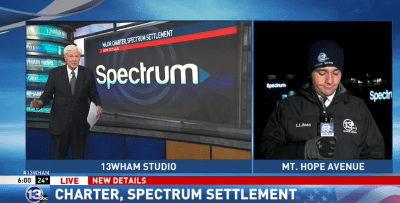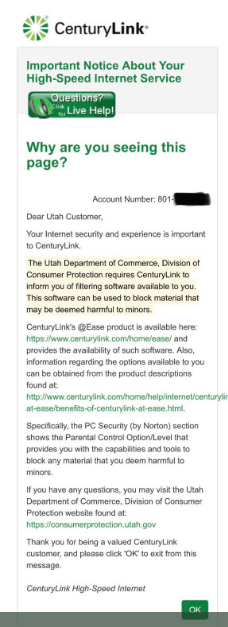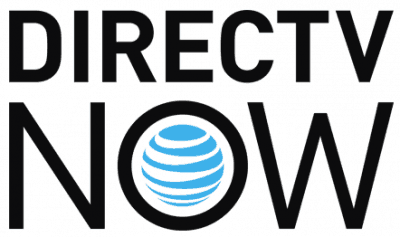 It was the leading story on local newscasts up and down New York State — Charter Spectrum, accused of failing to provide the internet speed and reliability it promised agreed to pay $174.2 million to settle a lawsuit filed by the New York Attorney General’s office.
It was the leading story on local newscasts up and down New York State — Charter Spectrum, accused of failing to provide the internet speed and reliability it promised agreed to pay $174.2 million to settle a lawsuit filed by the New York Attorney General’s office.
It was a story hard to miss. “Breaking News” tweets were sent from multiple television and newspaper newsrooms from Buffalo to Albany. Local newscasts in Buffalo, Rochester, Syracuse, Binghamton and Albany all included extensive coverage, while stations in Elmira and New York City mentioned it in passing. Newspapers gave the story the same treatment a winter storm might normally get. All gave the story of Spectrum’s settlement prominent coverage on their websites.
All except one.
Spectrum News — multiple 24/7 news channels serving Buffalo, Rochester, Syracuse, Albany, and the venerable NY1 from New York City, had absolutely nothing to say about the story on its many websites. In fact, Spectrum News did not cover the New York Public Service Commission’s decision to expel its parent company from the state either (a matter still under negotiation by the PSC and Charter Communications).
At Spectrum News, no news about the owner is apparently better than reporting bad news, so coverage is generally missing when it comes to reporting on the state’s largest cable company.

WHAM in Rochester, like many stations around the state, opened its newscast with news of the Spectrum settlement.
It did not used to be this way. In Rochester, Greater Rochester Cablevision began covering local news in 1990, with a firm firewall between the reporters at “WGRC” and company executives. That firewall remained in place through multiple rebrandings including GRC9News and R News, operated by Time Warner Cable, which bought the local cable company in 1995.
In 2009, R News fairly covered the controversy of Time Warner Cable trialing data caps in Rochester (a plan that was quickly shelved after subscriber blowback). But beginning in the 2010s, cracks in the firewall were rumored and reporters began avoiding stories painting their parent company in a bad light. By the time the news channel was rebranded YNN Rochester in the summer of 2009, reports about the cable company were brief at best. As the channel became Spectrum News Rochester in 2016, reporting on the cable company and its competitors was almost entirely gone altogether.
In April 2018, Rochester businessman and philanthropist Tom Golisano acquired Greenlight Networks, a fiber to the home provider competing directly with Charter Spectrum. It was breaking news and extensively covered in the local media, except by Spectrum News, which otherwise regularly covers Golisano’s activities.
 The apparent lack of a firewall and a potential written or unwritten/understood policy interfering with coverage of legitimate news is a serious blow to Spectrum News’ credibility. There is no legitimate reason we can find for Spectrum News to “miss” stories about its parent company, and in some instances reporters merely need to cross the building to interview local executives.
The apparent lack of a firewall and a potential written or unwritten/understood policy interfering with coverage of legitimate news is a serious blow to Spectrum News’ credibility. There is no legitimate reason we can find for Spectrum News to “miss” stories about its parent company, and in some instances reporters merely need to cross the building to interview local executives.
In Rochester, where the Gannett news empire was born in 1923, there is a long history of protecting journalistic credibility. When the Gannett Company published two daily local newspapers, the morning Democrat & Chronicle and the afternoon Times-Union fiercely competed with each other, with a strict firewall in place between the two newspapers. Reporters joked the only place they could interact was in a neutral zone where the newswire teletype machines once operated. There was never any question that a story about the Gannett Company would be fair and free of interference from the newspapers’ owners.
Spectrum News needs to adopt a similar policy and cover news that is worth covering, with no interference from company executives. Otherwise, it is little more than a token gesture to paying subscribers, who will always suspect corporate interference is alive and well at the news outlet.
Customers deserve better.




 Subscribe
Subscribe

 Brindisi, a Democrat from the Utica area,
Brindisi, a Democrat from the Utica area,  AT&T customers are telling Stop the Cap! the company is emailing their broadband customers to alert them they now qualify for unlimited internet access because they also happen to subscribe to DirecTV Now, AT&T’s streaming service targeting cord cutters.
AT&T customers are telling Stop the Cap! the company is emailing their broadband customers to alert them they now qualify for unlimited internet access because they also happen to subscribe to DirecTV Now, AT&T’s streaming service targeting cord cutters. It was the leading story on local newscasts up and down New York State — Charter Spectrum, accused of failing to provide the internet speed and reliability it promised agreed to pay $174.2 million to settle a lawsuit filed by the New York Attorney General’s office.
It was the leading story on local newscasts up and down New York State — Charter Spectrum, accused of failing to provide the internet speed and reliability it promised agreed to pay $174.2 million to settle a lawsuit filed by the New York Attorney General’s office.
 The apparent lack of a firewall and a potential written or unwritten/understood policy interfering with coverage of legitimate news is a serious blow to Spectrum News’ credibility. There is no legitimate reason we can find for Spectrum News to “miss” stories about its parent company, and in some instances reporters merely need to cross the building to interview local executives.
The apparent lack of a firewall and a potential written or unwritten/understood policy interfering with coverage of legitimate news is a serious blow to Spectrum News’ credibility. There is no legitimate reason we can find for Spectrum News to “miss” stories about its parent company, and in some instances reporters merely need to cross the building to interview local executives.